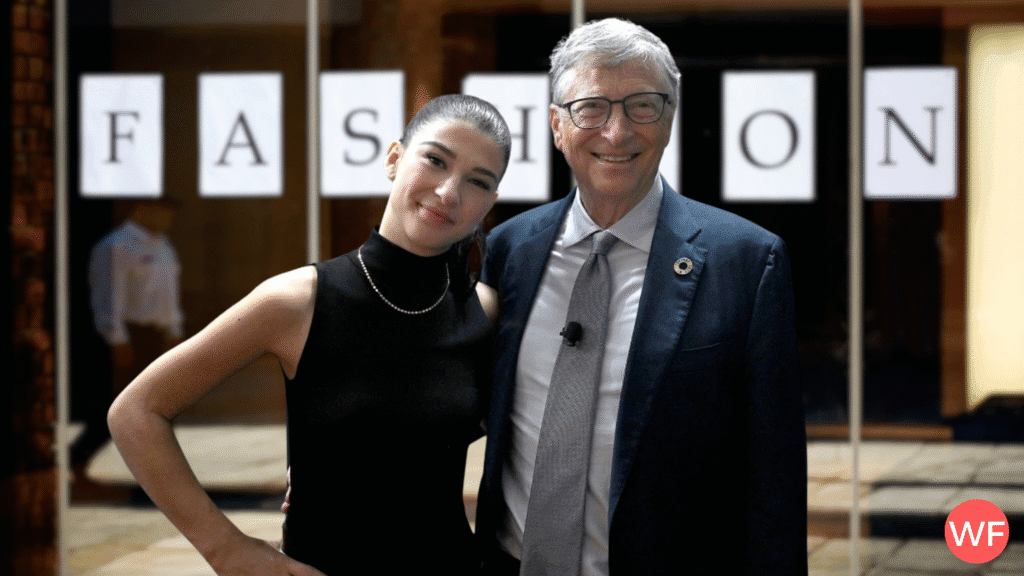In an era where the children of billionaires often inherit more than just wealth—access, power, and safety nets—Phoebe Gates, the youngest daughter of Bill and Melinda Gates, is charting a different course. She’s co-founded a climate-conscious fashion-tech startup called Phia, and she’s doing it without a cent of investment from her famous father.
While most would assume Bill Gates would be the first backer of his daughter’s startup, he took a surprising route: offering guidance, not money. His reason? “If I had invested, I’d have kept her on a short leash,” he said in an interview earlier this year.
What Is Phia?
Phia is a fashion discovery platform powered by AI, co-founded by Phoebe Gates and climate activist Sophia Kianni. The platform acts like the “Booking.com of fashion,” helping users find sustainable clothing options from over 40,000 different websites, including secondhand platforms and rental services. The goal? Make ethical fashion choices easier for Gen Z.
What sets Phia apart is its eco-focus and its smart integration of artificial intelligence—not just for backend operations, but also for content creation, marketing, and influencer outreach.
AI + Gen Z = Smart Marketing
Phoebe and Sophia are digital natives. To compete in a fast-paced world of social media, they used ChatGPT and other AI tools to reverse-engineer viral content. By studying high-performing Instagram and TikTok posts, they crafted similar content structures—something many legacy brands still struggle to do.
In a recent podcast episode of “The Burnouts”, which the duo co-hosts, they revealed how they used AI to:
- Create catchy video hooks,
- Script product ads in Gen Z tone,
- Even plan influencer collaborations more efficiently.
Bill Gates: The Supportive Mentor, Not Investor
Bill Gates didn’t write a check—but he’s still deeply involved in his daughter’s journey.
“When your daughter asks if you’d be willing to work a shift in customer service at her startup, the only right answer is: Yes.”
— Bill Gates on LinkedIn
Yes, he actually did a customer service shift at Phia.
Instead of dictating strategy or sitting on a board seat, Gates chose to mentor his daughter on topics like team building, leadership, and accountability. It’s mentorship without the strings that come with financial backing.
🧭 Melinda French Gates: Same Philosophy
Even Melinda Gates has taken the same stance. Despite her $31B fortune, she too declined to invest in Phia, encouraging Phoebe to grow her own wings. Her rationale was simple: “Let her build grit. Let her own the challenges.”
This united parenting approach has garnered attention from leadership coaches, startup mentors, and legacy families alike, who see this as a blueprint for empowering the next generation.
Phia’s Early Wins
- Already listed on sustainable shopping directories.
- Partnered with ethical brands and carbon-neutral shipping services.
- Run viral campaigns around Earth Day, Pride, and Gen-Z mental health.
- Raised funding from VCs including Soma Capital, while preserving the company’s mission of climate accountability.
The Burnouts Podcast: Raw and Real
Phoebe and Sophia didn’t just stop at building a startup—they’re also sharing the journey. Their podcast “The Burnouts” offers a behind-the-scenes look at building a company, pitching to VCs, failing fast, and figuring things out as young women founders.
Listeners get to hear:
- Real-time founder struggles,
- AI marketing experiments,
- Conversations on climate, fashion, and tech,
- And the occasional pep talk from Papa Gates.
Final Take: More Than a Billionaire’s Daughter
Phoebe Gates is redefining what legacy looks like. In building Phia, she’s proving that:
- Wealth doesn’t guarantee success—grit, clarity, and innovation do.
- AI is more than hype—it’s a powerful, democratizing tool for startups.
- Parental mentorship > financial backing, especially when autonomy matters.
Her story is one that blends privilege with purpose, legacy with learning, and tech with tenacity. With Bill Gates as her cheerleader—not check writer—Phoebe Gates might just become one of Gen Z’s most influential founders.


